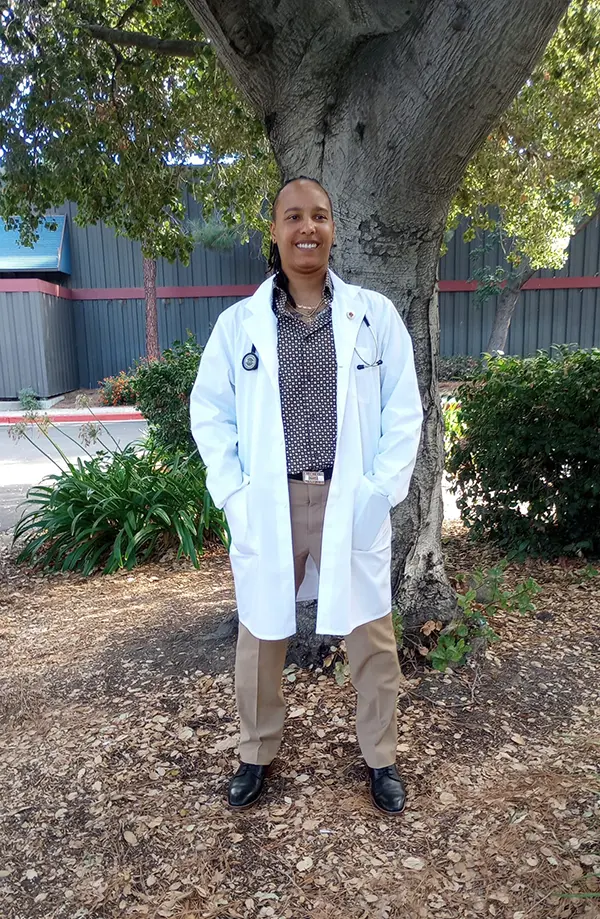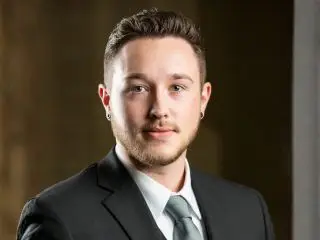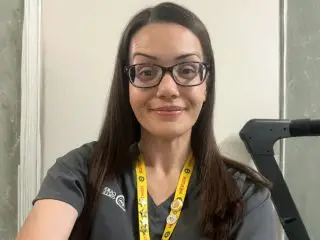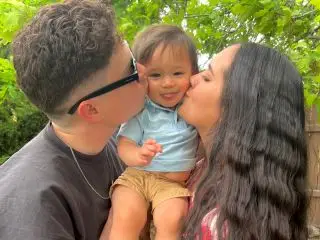 When Emily Times enrolled in the Respiratory Care (RC) program at Carrington College, she quickly made a great impression on her cohorts and instructors.
When Emily Times enrolled in the Respiratory Care (RC) program at Carrington College, she quickly made a great impression on her cohorts and instructors.
“Emily was professional and demonstrated critical thinking and effective communication, not just in class and lab, but also during externship,” says Rita Ga, Director for the Respiratory Care program at Carrington College, Pleasant Hill. “Our program requires a total of 705 lecture hours, 450 lab hours, and 540 clinical hours. Emily excelled through it. Even when there were challenges, she didn’t quit. She’s a natural leader and a professional. She was invited back to all her externships not just as a student but as an employee. Our RC program is honored to nominate Emily Times.”
Emily graduated the RC program in November of 2023, and is about to begin a new career as a Registered Respiratory Therapist.
What did you do before you enrolled in the Respiratory Care program at Carrington College?
I worked as an EMT for over 10 years.
How did you know you wanted to study respiratory care?
I knew I wanted to move up further in the medical field from EMT. Nursing was an option, but it just wasn’t the right fit for me.
I didn’t know what a Respiratory Care Practitioner was until I met a man named Marshall, a Respiratory Therapist who was taking care of my grandmother while she fought Covid pneumonia (thankfully, she recovered). I was really interested in what Marshall did, so I asked him some questions and I looked into it after that. It’s interesting that it takes the same intelligence, expertise, and amount of knowledge as nursing, but it’s a different skill you’re using to help people.
What was your favorite part of the Respiratory Care program?
As an EMT, I already knew quite a bit about critical care and basic medical and life support. I already knew the medical terminology, which was helpful, but my favorite thing in the program was learning about hemodynamics and ventilators and how they work to support the body.
My teacher for that was Miss Reames and she was excellent; she made it easy to understand everything and was great at laying it all out and tying it all together. I got an in-depth education about how the heart and lungs work to support the body. That was the highlight for me.
What was the most challenging part of the program?
I continued to work as an EMT during my time as a student, so the most challenging part was keeping my current work schedule and coordinating between work and getting to school and clinical. The late nights and long drives to the clinical sites were hard. I often had to sacrifice pay by missing shifts, or sometimes letting a coworker down because I couldn’t be there, because it didn’t coordinate with my clinical schedule.
Where did you do your clinical rotations?
I did clinical at four different places: Generations in Walnut creek, Sonoma Specialty Hospital, Queen of the Valley in Napa, and Kaiser San Francisco. These were hospitals or facilities that specialized in sub-acute, acute, trauma, or critical care.
Where do you work as a Registered Respiratory Therapist? What are your responsibilities on the job?
I’m excited because I just accepted a job with a long-term care facility in Walnut Creek. I should be starting sometime in January. My duties will be to examine patients with cardiopulmonary disorders or breathing problems, perform diagnostic tests on the lung capacity of the patient, perform tracheostomy care, and to cooperate with physicians to help develop treatment plans. I’ll need to demonstrate an excellent working knowledge of Respiratory Care instruments and equipment, such as ventilators and CPAP/BiPAP machines, and maintain accurate and complete documentation of respiratory care procedures.
Do you have any words of advice for students who are just getting started in the program?
Know that you have to have determination and the mindset to get through this program and realize too that you can’t do it alone. You need to ask for support from friends and family, and you will lean on your cohorts/fellow classmates.
Establish study groups, get familiar with your cohorts, and look to each other for help throughout the program. They are not your competition; you are all in it together. They might understand something that you do not, or you might need help getting through homework assignments, and sometimes you’ll be the one helping them, too. Support from my cohorts, friends, and family is what got me through.



